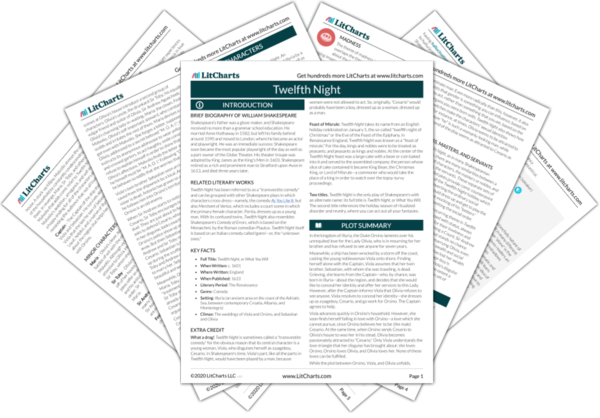Every major character in Twelfth Night experiences some form of desire or love. Duke Orsino is in love with Olivia. Viola falls in love with Orsino, while disguised as his pageboy, Cesario. Olivia falls in love with Cesario. This love triangle is only resolved when Olivia falls in love with Viola's twin brother, Sebastian, and, at the last minute, Orsino decides that he actually loves Viola. Twelfth Night derives much of its comic force by satirizing these lovers. For instance, Shakespeare pokes fun at Orsino's flowery love poetry, making it clear that Orsino is more in love with being in love than with his supposed beloveds. At the same time, by showing the details of the intricate rules that govern how nobles engage in courtship, Shakespeare examines how characters play the "game" of love.
Twelfth Night further mocks the main characters' romantic ideas about love through the escapades of the servants. Malvolio's idiotic behavior, which he believes will win Olivia's heart, serves to underline Orsino's own only-slightly-less silly romantic ideas. Meanwhile, Sir Andrew Aguecheek, Sir Toby Belch, and Maria, are always cracking crass double entendres that make it clear that while the nobles may spout flowery poetry about romantic love, that love is at least partly motivated by desire and sex. Shakespeare further makes fun of romantic love by showing how the devotion that connects siblings (Viola and Sebastian) and servants to masters (Antonio to Sebastian and Maria to Olivia) actually prove more constant than any of the romantic bonds in the play.
Desire and Love ThemeTracker

Desire and Love Quotes in Twelfth Night
Give me excess of it; that, surfeiting,
The appetite may sicken, and so die.
That it alone is high fantastical.
If you will lead these graces to the grave
And leave the world no copy.
And call upon my soul within the house;
Write loyal cantons of contemned love
And sing them loud even in the dead of night;
Halloo your name to the reverberate hills
And make the babbling gossip of the air
Cry out 'Olivia!' O, You should not rest
Between the elements of air and earth
But you should pity me.
Present mirth hath present laughter:
What's to come is still unsure.
In delay there lies no plenty;
Then come kiss me, sweet and twenty:
Youth's a stuff will not endure.
An elder than herself: so wears she to him,
So sways she level in her husband's heart:
For, boy, however we do praise ourselves,
Our fancies are more giddy and unfirm,
More longing, wavering, sooner lost and worn,
Than women's are.
As it might be, perhaps, were I a woman,
I should your lordship.
Orsino: And what's her history?
Viola: A blank, my lord. She never told her love,
But let concealment, like a worm i' the bud,
Feed on her damask cheek: she pined in thought,
And with a green and yellow melancholy
She sat like patience on a monument,
Smiling at grief. Was not this love indeed?
And let me see thee in thy woman's weeds.
Kept in a dark house, visited by the priest,
And made the most notorious geck and gull
That e'er invention played on? Tell me why.
















